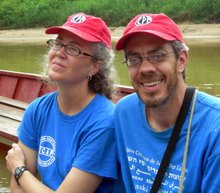Dear Friends and Family,
We are back from our trip to Garzal where we enjoyed experiencing a rural Christmas. Click the picture below to see some of our photos from the trip:
 |
| Garzal |
We found many of the Christmas traditions to be familiar. Families were enjoying out of town guests. A common meal was prepared and shared by many families before going to Christmas Eve church services. Some families gave small gifts to their children. We enjoyed special foods that are usually only prepared at Christmas, including tamales and a spice cake baked over a wood fire. And, some in the community celebrated with drinking beer all through the night and into the next day.
A memorable part of our stay in Garzal was the Christmas Eve vigil at a small evangelical church in the community. (The pastor’s family was our main host for the week so our decision about whether to spend Christmas Eve with the church-goers or beer drinkers was clear.) The pastor, perhaps running short on music to keep the 4-hour vigil going until midnight asked us if we would sing a song. We agreed and sang ‘Joy to the World’ and ‘Silent Night’, explaining that in many churches in the US on Christmas Eve, the lights are extinguished and Silent Night is sung by candlelight. The pastor decided to end their vigil in the same way, so they passed out candles, turned off the generator, and we all sang ‘Noche de Paz’ at midnight. It made us both a little teary to enjoy a tradition from home and to think of many of you singing the same song that night.
We also enjoyed swimming in the Magdalena River, which is the color of chocolate milk, with our host’s family. And, on our last night with the family, we sat around joking and singing before going to bed. They asked us to sing for them and said they would sing for us in return. We sang Jingle Bells and then taught them the chorus. Several people caught on quite quickly while some of the grandchildren got the tune but used the typical “shwah, shwah” sounds to imitate the English words. I imagine we will still be hearing the grandchildren sing “Jingle shwah, Jingle shwah, Jingle shwah, shwah, shwah” to the tune of Jingle Bells when we return to their home.
While this Christmas was free from violence for the people of Garzal, our many conversations with families reminded us that the threats they are facing continue to be very real. Although many have farmed the land for 40 years, they are in the midst of a 6-year-long struggle to gain titles to their land, titles they have a right to under Colombian law. In the past few months the struggle has intensified with increased pressure from illegal armed groups for the families to abandon their farms. Fortunately, more human rights workers and a lawyer have joined with the community to work on their behalf. As we listened to the worry of so many farmers about the possibility of losing their land and their livelihood we were reminded of the words of a Colombian mother we met on our first visit to Colombia. She described peace as “going to bed at night with a roof over your head, food for your family, and freedom from fear”. We pray that 2008 will be the year the families of Garzal receive the titles to their land, and we all can rejoice with them in being just a little closer to Peace on Earth.
May you and your community have a roof over your head, food for your family and freedom from fear in 2008.
In Peace,
Michele and Nils
Bonus Christmas Song -
People who live in rural communities have access to an abundance of fresh food and are happy to share, but by the end of our time we were beginning to feel like we were in a food-themed ‘Twelve Days of Christmas’, which inspired the following:
Seven Days of Christmas in Garzal
On the seventh day in Garzal, a neighbor gave to me
Seven cups of coffee
Six coconuts
Five kilos of oranges
Four cups of tamarind pulp
Three sour guavas
Two ripe bananas
And a chicken tamale wrapped in banana leaves!
CPT MISSION STATEMENT: Christian Peacemaker Teams (CPT) Colombia is a
community made up of trained volunteers from different cultures that forms part of the international, ecumenical organization, CPT. Our work is based in, though not limited to, the Middle Magdalena region of Colombia. We work together on grassroots initiatives to expose and transform structures of domination and oppression through active nonviolence in order to make possible a world grounded in respect, justice and love, even of enemies.
Read more or make a donation at www.cpt.org.












